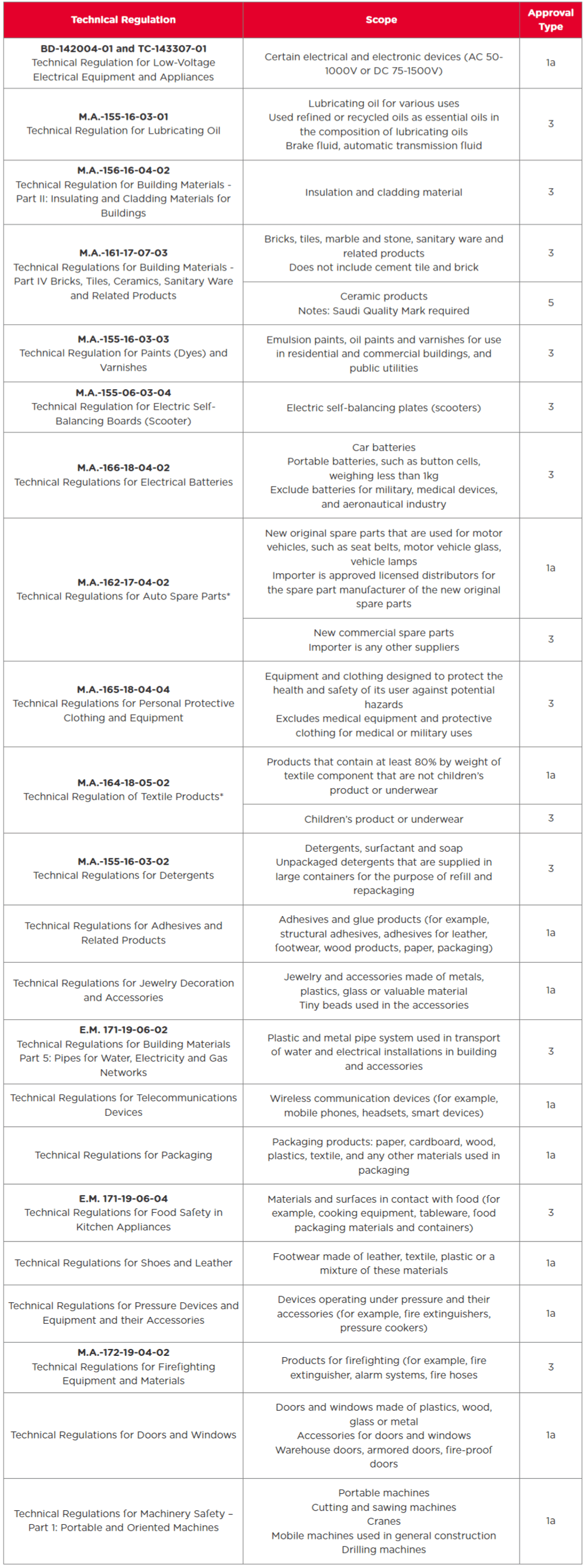SASO Announcement
On July 1, 2020 the SABER platform was linked with the FASAH system. This integration ensures the automatic verification of Shipment Certificates – there is no need to print a Shipment Certificate of Conformity (SCoC) as it will automatically be in the FASAH system. Any shipment to Saudi Arabia that does not have an SCoC will be required to be re-exported.
The Saudi Standards, Metrology and Quality Organization (SASO) manages the Saudi Product Safety Program called "SALEEM".
The SALEEM program is concerned with the safety of products entering the Saudi market, which is why the program is called SALEEM. In Arabic, SALEEM indicates that the product is safe, secure, and free of flaws that may directly or indirectly harm individuals, society, or the environment.
Under SALEEM, product and shipment conformity program is operated via an online system called SABER. SABER has been gradually implemented by technical regulation (TR) since January 2019. The transition was completed in February 2020. Importers of products regulated by the TR are required to register the products in the SABER system to obtain the Certificate of Conformity, after passing the assessment.
All product consignments intended to be imported to the Kingdom of Saudi Arabia must present the Certificates of Conformity at Saudi Customs for a smooth clearance.
Need more information?
By contacting QIMA you agree to our privacy policy and terms and conditions
QIMA: A SASO-Approved Conformity Assessment Body
QIMA is one of the SASO approved Conformity Assessment Bodies (CB) and is authorized to issue Certificates of Conformity for products exporting from the following regions:
SABER System
SABER is a platform that allows importers and local manufacturers to electronically obtain the required Certificate of Conformity and Certificate of Shipment Conformity for consumer goods, whether they were imported or locally manufactured to enter the Saudi market. The platform aims to protect the businesses from fraud and ensure that products are free from defects that may affect the health and safety of consumers.
Importers and local manufacturers can request a Certificate of Conformity (both Product and Shipment Certificates of Conformity) for their products easily through SABER.
The mechanism of the SABER system is divided into 3 steps as below.

*Risk level of product
The risk level of a product is assigned by the system based on the supplied HS code and product category. Those items that are not regulated by any Saudi Arabian technical regulations are classified as low-risk items.
Product Registration
The importer inputs details of the product into SABER
The SABER system verifies if the product is regulated or not based on HS code or product category
Type Approval Certificate (Product Certificate of Conformity)
Scope: Products that are regulated by Saudi Arabia TR. Click here for a list of technical regulations. For products not regulated by Saudi Arabia TR, self-declaration according to the approved forms by SASO is sufficient – , Type Approval Certificates are not needed.
Validity: One year
Required documents:
Conformity documents such as test reports, quality certificates, risk assessment reports, inspection report etc., if applicable
Design, dimensions, plans, specification photo of the products, if applicable
The Type Approval Certificate will be issued through the SABER system after compliance to relevant standards is proven and after approval by SASO Approved Conformity Assessment Body.
Shipment Certificate of Conformity
Scope: All products
Validity: Per consignment
Required documents:
Type Approval Certificate or self-declaration
Shipment document, such as invoice, packing list, bill of lading etc.
A Shipment Certificate is required for each consignment. Issuance of Shipment Certificates for shipments of non-regulated products and regulated products are done through SABER.
On July 1, 2020 the SABER platform was linked with the FASAH system. This integration ensures the automatic verification of Shipment Certificates – there is no need to print a Shipment Certificate of Conformity (SCoC) as it will automatically be in the FASAH system. Any shipment to Saudi Arabia that does not have an SCoC will be required to be re-exported.
SASO Approved Technical Regulations
QIMA is able to approve Product Certificates of Conformity for a number of product categories. The table below contains details on these SASO approved Technical Regulations, their scope and type of approval.
A note on approval types: Approval types 1a, 3 and 5 refer to the assessment types defined in ISO/IEC 17067. Different conformity assessment activities are required for each type as applicable:
Type 1a: Product testing / inspection
Type 3: Product testing / factory inspection / audit
Type 5: Product testing / factory inspection / surveillance factory audit

*Textile Products & Auto Spare Parts are subject to a Categorized Conformity Assessment which enables similar products to be grouped together covered by a single PCoC. This effectively reduces the number of PCoCs required for importing products into Saudi Arabia and streamlines the certification process.
For a full list of SASO approved Technical Regulations, click here.
Please note the following:
QIMA will stop issuing any SASO CoC for regulated products under the remaining technical regulations (TR) from the SABER system / SABER CoC program starting on 15/01/2020.
QIMA will issue only the PCoCs for regulated products from the SABER platform.
All traders shall obtain the shipment certificate for all non-regulated products via the SABER platform.
Starting from 15/02/2020, no shipment will enter Saudi Arabia unless it has the required certifications via SABER only.
